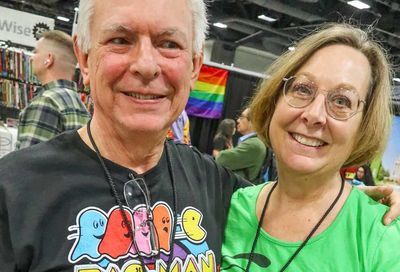True Stories
There are several documentaries of particular interest to the LGBT community in this year's Silverdocs festival
When truth can be stranger than fiction, documentaries can eclipse feature films in their ability to enthrall, entertain and educate. Now in its eighth year, Silverdocs is a seven-day festival of documentaries sponsored by AFI and the Discovery Channel (it runs from June 21-27). Featuring just over 100 films, there are several documentaries of particular interest to the LGBT community.
Susan Koch’s The Other City is a ”should-see” for everyone, but a ”must-see” for those living in and around the District. It’s no secret that there’s a great disparity of wealth, power and influence in our nation’s capital, but filmmaker Koch removes the layers that often cloak those living with HIV/AIDS.

Gender-benders: Regretters
If 1 percent of a region’s population is infected with a disease, it’s considered an epidemic; D.C.’s infection rate is three times that. Koch uses her camera to show the faces behind the statistics. Ranging from formerly incarcerated felons, to a young gay man about to die, to an activist running prevention programs, the stories are all told with great compassion and caring. For example, hearts will ache for J’Mia, an HIV-positive mother of three who faces homelessness unless she can find housing in three months (most waiting lists for housing average two or three years). Koch gets J’Mia to be forthright to the point of discomfort, but it’s handled with respect. And this is the secret to the documentary’s success — Koch interweaves the stories to present a wide swath of those impacted by HIV/AIDS while capturing the dignity and determination of each subject. With so much attention focused on Capitol Hill every day, Koch ably turns the focus to other quadrants of the city where more light needs to shine.
Playing with The Other City is Ira Sachs‘s minimalist Last Address, which is comprised of outdoor shots of the last homes where important artists who died from AIDS-related illnesses lived. Sachs provides no music other than the natural sounds of the city, and just a brief listing of the buildings’ former occupants. While some are household names – Keith Haring and Robert Mapplethorpe – others are far less known. Ultimately, Last Address is better in concept than execution. While a semi-zen state might be achieved after relaxing into the sounds of the city, you can only stare at a brick wall for so long.
Another highlight of the festival is the Swedish doc Regretters, directed by Marcus Lindeen, which captures two men who were formerly women and were men before that, as they struggle to articulate to each other why they made decisions to change their gender. There is very little fanfare in the film: two chairs, two individuals, two very complex stories. Mikael is the tougher person to accept – his accusation that it was the surgeon’s fault for not talking him out of this ”mistake” rings hollow. Orlando, on the other hand, is more articulate about his thought process and journey. Since the subjects interview each other for the majority of the film, their stories unfold naturally, and Orlando’s recounting of his 11-year marriage is downright suspenseful. Throughout it all, it’s clear that even they aren’t completely sure what their multiple gender-reassignment surgeries mean.





Plays June 27
6:45 p.m.
REGRETTERS




Plays June 25
6:15 p.m.
AFI Silver Theatre
Full schedule at
www.Silverdocs.com
While both delve into issues and topics that would fascinate an academic or medical professional, Lindeen ensures the story remains personal. He does two things in particular that makes Regretters so successful. One, by having Orlando and Mikael interview each other, they are able to push boundaries in ways that only a peer can. Also, by providing the two stories in tandem, it’s a fascinating examination of gender that avoids making either subject into a representative for any group. While answers aren’t readily apparently at the end of the film, the two men do raise some intriguing questions.
In an interesting pairing with Regretters, Jonathan Skurnik’s I’m Just Anneke packs a lot of punch into 11 minutes. Pre-teen Anneke is biologically a girl, but has serious doubts whether this is correct. Supported by unbelievably understanding parents, Anneke is undergoing hormone therapy treatments to suppress her physical development until she is sure of her gender. Following Anneke from the mundane (hockey practice and hanging out with friends) to the necessary (visits to the hospital for treatment), Skurnik captures Anneke’s wonderful personality on film, and shows that a little parental understanding and love can really change a child’s life. It’s amazing to watch Anneke struggle with the same questions as Orlando and Mikael, and her composure and maturity proves that she is truly a remarkable person.
Support Metro Weekly’s Journalism
These are challenging times for news organizations. And yet it’s crucial we stay active and provide vital resources and information to both our local readers and the world. So won’t you please take a moment and consider supporting Metro Weekly with a membership? For as little as $5 a month, you can help ensure Metro Weekly magazine and MetroWeekly.com remain free, viable resources as we provide the best, most diverse, culturally-resonant LGBTQ coverage in both the D.C. region and around the world. Memberships come with exclusive perks and discounts, your own personal digital delivery of each week’s magazine (and an archive), access to our Member's Lounge when it launches this fall, and exclusive members-only items like Metro Weekly Membership Mugs and Tote Bags! Check out all our membership levels here and please join us today!




















